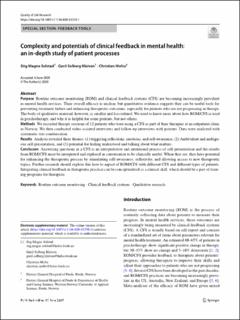| dc.contributor.author | Solstad, Stig Magne | |
| dc.contributor.author | Kleiven, Gøril Solberg | |
| dc.contributor.author | Moltu, Christian | |
| dc.coverage.spatial | Norway | en_US |
| dc.date.accessioned | 2020-12-10T13:44:30Z | |
| dc.date.available | 2020-12-10T13:44:30Z | |
| dc.date.created | 2020-07-29T11:06:09Z | |
| dc.date.issued | 2020 | |
| dc.identifier.citation | Solstad, S. M., Kleiven, G. S., & Moltu, C. (2020). Complexity and potentials of clinical feedback in mental health: An in-depth study of patient processes. Quality of Life Research. | en_US |
| dc.identifier.issn | 0962-9343 | |
| dc.identifier.uri | https://hdl.handle.net/11250/2716967 | |
| dc.description.abstract | Purpose
Routine outcome monitoring (ROM) and clinical feedback systems (CFS) are becoming increasingly prevalent in mental health services. Their overall efficacy is unclear, but quantitative evidence suggests they can be useful tools for preventing treatment failure and enhancing therapeutic outcomes, especially for patients who are not progressing in therapy. The body of qualitative material, however, is smaller and less refined. We need to know more about how ROM/CFS is used in psychotherapy, and why it is helpful for some patients, but not others.
Methods
We recorded therapy sessions of 12 patients who were using a CFS as part of their therapies at an outpatient clinic in Norway. We then conducted video-assisted interviews and follow-up interviews with patients. Data were analyzed with systematic text condensation.
Results
Analysis revealed three themes: (1) triggering reflections, emotions, and self-awareness, (2) Ambivalent and ambiguous self-presentation, and (3) potential for feeling understood and talking about what matters.
Conclusion
Answering questions in a CFS is an interpretative and intentional process of self-presentation and the results from ROM/CFS must be interpreted and explored in conversation to be clinically useful. When they are, they have potential for enhancing the therapeutic process by stimulating self-awareness, reflexivity, and allowing access to new therapeutic topics. Further research should explore this how-to aspect of ROM/CFS with different CFS and different types of patients. Integrating clinical feedback in therapeutic practice can be conceptualized as a clinical skill, which should be a part of training programs for therapists. | en_US |
| dc.language.iso | eng | en_US |
| dc.publisher | Springer | en_US |
| dc.rights | Navngivelse 4.0 Internasjonal | * |
| dc.rights.uri | http://creativecommons.org/licenses/by/4.0/deed.no | * |
| dc.subject | routine outcome monitoring | en_US |
| dc.subject | clinical feedback systems | en_US |
| dc.subject | qualitative research | en_US |
| dc.title | Complexity and potentials of clinical feedback in mental health: an in-depth study of patient processes | en_US |
| dc.type | Peer reviewed | en_US |
| dc.type | Journal article | en_US |
| dc.description.version | publishedVersion | en_US |
| dc.rights.holder | © The Author(s) 202 | en_US |
| dc.source.pagenumber | 0 | en_US |
| dc.source.journal | Quality of Life Research | en_US |
| dc.identifier.doi | 10.1007/s11136-020-02550-1 | |
| dc.identifier.cristin | 1820845 | |
| dc.relation.project | Helse Vest RHF: 913032 | en_US |
| cristin.ispublished | true | |
| cristin.fulltext | original | |
| cristin.qualitycode | 2 | |

